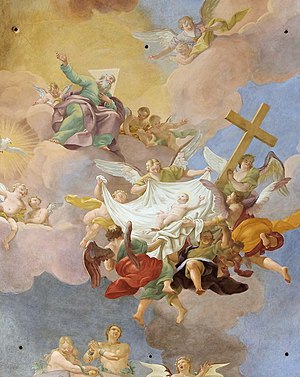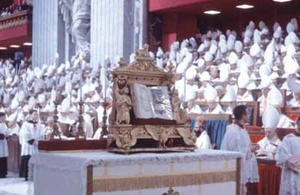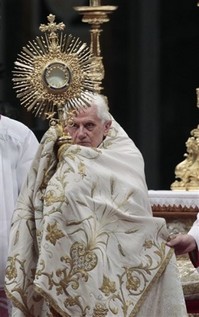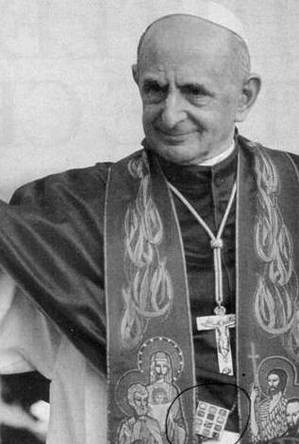In the Pauline Chapel in Apostolic Palace, Pope Francis offered Mass with some of the cardinals on the feast of Saint George, the name day of the Pope, Saint George. There are several stellar points made the Pope noted below with my emphasis. In these days when one’s identity as a Christian is questioned, or even rejected for superficial reasons, I think that if you consider what the Church teaches, especially through the eyes of Pope Benedict and now through Pope Francis, you will notice the truth, not ideology, joy, not grumpiness. The Pope uses another previous pope to help him and us to understand the work of the Church –her mission– under the power of the Holy Spirit.
The [first] reading today makes me think that the missionary expansion of the Church began precisely at a time of persecution, and these Christians went as far as Phoenicia, Cyprus and Antioch, and proclaimed the Word. They had this apostolic fervor within them, and that is how the faith spread! Some, people of Cyprus and Cyrene – not these, but others who had become Christians – went to Antioch and began to speak to the Greeks too. It was a further step. And this is how the Church moved forward. Whose was this initiative to speak to the Greeks? This was not clear to anyone but the Jews. But … it was the Holy Spirit, the One who prompted them ever forward … But some in Jerusalem, when they heard this, became ‘nervous and sent Barnabas on an “apostolic visitation”: perhaps, with a little sense of humor we could say that this was the theological beginning of the Doctrine of the Faith: this apostolic visit by Barnabas. He saw, and he saw that things were going well.
And so the Church was a Mother, the Mother of more children, of many children. It became more and more of a Mother. A Mother who gives us the faith, a Mother who gives us an identity. But the Christian identity is not an identity card: Christian identity is belonging to the Church, because all of these belonged to the Church, the Mother Church. Because it is not possible to find Jesus outside the Church. The great Paul VI said: “Wanting to live with Jesus without the Church, following Jesus outside of the Church, loving Jesus without the Church is an absurd dichotomy.” And the Mother Church that gives us Jesus gives us our identity that is not only a seal, it is a belonging. Identity means belonging. This belonging to the Church is beautiful.
Continue reading Pope Francis: cannot believe in Jesus without the Church








